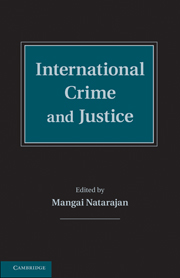Book contents
- Frontmatter
- Contents
- List of Figures
- List of Tables
- List of Contributors
- Foreword
- Preface
- Introduction
- Part I International Criminology
- 1 The Globalization of Crime
- 2 Routine Activities and Transnational Crime
- 3 Migration and Crime
- 4 Political Violence
- 5 Victimology
- 6 Children and International Criminal Justice
- 7 Women and International Criminal Justice
- 8 Culture and Crime
- Part II Law, Punishment, and Crime Control Philosophies of the World
- Part III Transnational Crime
- Part IV Organized Crime and Terrorism
- Part V International crime
- Part VI Delivering International Justice
- Part VII International Cooperation and Criminal Justice
- Part VIII International Research and Crime Statistics
- Part IX International research resources
- World Map
- Index
- References
1 - The Globalization of Crime
Published online by Cambridge University Press: 05 October 2014
- Frontmatter
- Contents
- List of Figures
- List of Tables
- List of Contributors
- Foreword
- Preface
- Introduction
- Part I International Criminology
- 1 The Globalization of Crime
- 2 Routine Activities and Transnational Crime
- 3 Migration and Crime
- 4 Political Violence
- 5 Victimology
- 6 Children and International Criminal Justice
- 7 Women and International Criminal Justice
- 8 Culture and Crime
- Part II Law, Punishment, and Crime Control Philosophies of the World
- Part III Transnational Crime
- Part IV Organized Crime and Terrorism
- Part V International crime
- Part VI Delivering International Justice
- Part VII International Cooperation and Criminal Justice
- Part VIII International Research and Crime Statistics
- Part IX International research resources
- World Map
- Index
- References
Summary
Transnational crime is not a new phenomenon. The Barbary pirates that terrorized the numerous states along the Mediterranean, the trade in coolies from Macao by nineteenth-century Chinese crime groups (Seagrave, 1995), and the international movement and exchanges of Italian mafiosi for the last century illustrate that crime has always been global. Already in the 1930s, Italian organized criminals in the United States were traveling to Kobe, Japan, and Shanghai, China, to buy drugs, and members of U.S. crime gangs took refuge in China in the 1930s to avoid the reach of American law enforcement (Kaplan & Dubro, 2003). Italian organized crime was renewed in the United States by new recruits from Italy, and the postwar resurgence of the Mafia in Italy was facilitated by the arrival of American mafiosi with the U.S. military in Sicily in 1943. An active white slave trade existed between Eastern Europe and Argentina and Brazil in the early decades of the twentieth century (Glickman, 2000; Vincent, 2005).
What has changed from the earlier decades of transnational crime is the speed, the extent, and the diversity of the actors involved. Globalization has increased the opportunities for criminals, and criminals have been among the major beneficiaries of globalization. The criminals’ international expansion has been made possible by the increasing movement of people and goods and the increasing ease of communication that have made it possible to hide the illicit among the expanding licit movement of people and goods. More significantly, the control of crime is state-based, whereas nonstate actors such as criminals and terrorists operate transnationally, exploiting the loopholes within state-based legal systems to expand their reach.
- Type
- Chapter
- Information
- International Crime and Justice , pp. 3 - 10Publisher: Cambridge University PressPrint publication year: 2010
References
- 2
- Cited by



